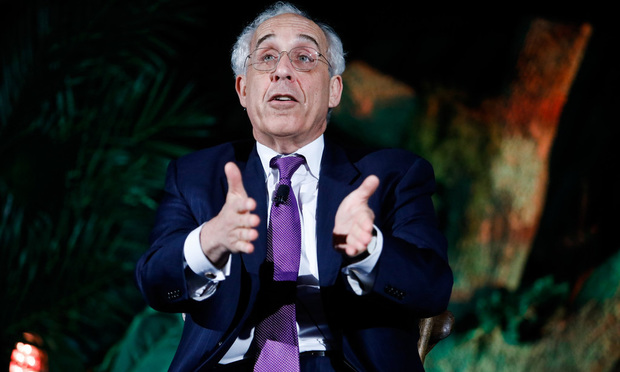Arbitration Ally Says Only Law School 'Ivory Tower' Champions Class Actions
"What the legal system is terrible at is remedying individual injuries because it's so expensive," Mayer Brown partner Andrew Pincus said Wednesday at a U.S. Chamber litigation conference. Pincus was a lead attorney in a suit the Chamber filed to challenge a Consumer Financial Protection Bureau rule to restrict the use of mandatory arbitration clauses that keep consumers out of court. The U.S. Senate late Tuesday blocked the rule.
October 25, 2017 at 02:26 PM
22 minute read
 Mayer Brown's Andrew Pincus, speaking at the 18th Annual Legal Reform Summit, held at the U.S. Chamber of Commerce in Washington, on Wednesday. Photo: Diego M. Radzinschi/ ALM.
Mayer Brown's Andrew Pincus, speaking at the 18th Annual Legal Reform Summit, held at the U.S. Chamber of Commerce in Washington, on Wednesday. Photo: Diego M. Radzinschi/ ALM. A day after the U.S. Senate narrowly voted to void the Consumer Financial Protection Bureau's rule restricting mandatory arbitration clauses, a top lawyer in Washington who'd challenged the regulation demurred from taking much of a victory lap. But he broadly defended arbitration as a “very low cost, very quick” way to resolve disputes.
Mayer Brown partner Andrew Pincus, who filed a lawsuit in Texas federal court last month contesting the regulation on behalf of the U.S. Chamber of Commerce and a coalition of financial industry trade groups, did not address in remarks on Wednesday the future of that case or specifically mention the Senate vote.
Pincus, speaking Wednesday at a U.S. Chamber of Commerce event titled “The Litigation Jungle,” criticized class actions as too often serving the interests of plaintiff lawyers over the harmed consumers they represent.
The CFPB's rule would not have outright banned arbitration clauses but instead prevented them from including terms that force consumers to waive their right to band together to file class actions. If President Donald Trump signs the legislation repealing the CFPB arbitration rule, which only passed the Senate with Vice President Mike Pence's tie-breaking vote, the litigation in the U.S. District Court for the Northern District of Texas will be rendered moot.
Answering a question in which the moderator, Forbes senior editor Daniel Fisher, described the Senate vote as a victory for the Chamber of Commerce, Pincus said most consumer injuries are so specific to the individuals that they do not qualify for a class action.
“In the imaginary, ivory tower world of law school and law professors, class actions are great—you know, if they were cost-free and only filed in meritorious cases. But in the real world, most of the injuries that real people suffer—like a credit card bill that has some number that shouldn't be on it or late charges—they're individualized injuries,” Pincus said. “And what the legal system is terrible at is remedying individual injuries because it's so expensive. Unless the injury is enormous, no sane person would open the door to litigation. Arbitration allows for very low cost, very quick remedying of those individual injuries.”
Pincus has long sung the praises of arbitration. In July, shortly after the CFPB finalized the arbitration rule, Pincus appeared at a U.S. Chamber event where he described the regulation as “not rooted in reality” and said it underscored the pitfalls of insulating a regulatory agency from the political process.
In 2010, he argued on behalf of AT&T in a Supreme Court case in which the justices, ruling 5-4, established that companies could use arbitration agreements to forbid consumers from joining together for class actions. Arbitration agreements have proliferated in the years since the court's 2011 decision, in AT&T v. Concepcion.
Building up to the Senate's vote late Tuesday night, Trump appointees mounted public critiques of the arbitration rule, forcing CFPB Director Richard Cordray to publicly come out in the rule's defense.
 CFPB Director Richard Cordray
CFPB Director Richard CordrayKeith Noreika, a former partner at Simpson Thacher & Bartlett who was named acting comptroller of currency in May, had faulted the CFPB analysis at the foundation of the arbitration rule and raised concerns that the regulation would risk the “safety and soundness” of the financial system.” On Monday, the Treasury Department published a report arguing that the arbitration rule opened a door for more class actions and would “effect a large wealth transfer to plaintiffs' attorneys.”
Late Tuesday, Cordray described the Senate's 51-50 vote as a “giant setback for every consumer in this country.” If Trump signs the legislation, the CFPB rule will be the 15th regulation repealed this year under the Congressional Review Act—a tool that gives lawmakers 60 legislative days to reverse an agency rule. Before this year, the law had been successfully used only once in its 21-year history.
“Wall Street won and ordinary people lost,” Cordray said in a prepared statement. “This vote means the courtroom doors will remain closed for groups of people seeking justice and relief when they are wronged by a company. It preserves a two-tiered justice system where banks can have their day in court but deny their customers the same right.”
Cordray said the Senate vote “robs consumers of their most effective legal tool against corporate wrongdoing. As a result, companies like Wells Fargo and Equifax remain free to break the law without fear of legal blowback from their customers.” He urged Trump to veto the resolution.
Read more:
Anthony Alexis, Enforcement Chief at CFPB, Is Leaving Agency
Mayer Brown's Andy Pincus, Ex-CFPB Attorney Deepak Gupta Debate Arbitration Rule
Trump's Treasury Department Hits Plaintiffs Lawyers Over CFPB's Arbitration Rule
The CFPB, Often a Winner in Court, Hit a Rough Patch This Summer
CFPB Loses a Trial Court Ally in the US Justice Department
Richard Cordray Gives No Signal of Departure Plans as CFPB Finalizes Payday Rule

A day after the U.S. Senate narrowly voted to void the Consumer Financial Protection Bureau's rule restricting mandatory arbitration clauses, a top lawyer in Washington who'd challenged the regulation demurred from taking much of a victory lap. But he broadly defended arbitration as a “very low cost, very quick” way to resolve disputes.
Pincus, speaking Wednesday at a U.S. Chamber of Commerce event titled “The Litigation Jungle,” criticized class actions as too often serving the interests of plaintiff lawyers over the harmed consumers they represent.
The CFPB's rule would not have outright banned arbitration clauses but instead prevented them from including terms that force consumers to waive their right to band together to file class actions. If President Donald Trump signs the legislation repealing the CFPB arbitration rule, which only passed the Senate with Vice President Mike Pence's tie-breaking vote, the litigation in the U.S. District Court for the Northern District of Texas will be rendered moot.
Answering a question in which the moderator, Forbes senior editor Daniel Fisher, described the Senate vote as a victory for the Chamber of Commerce, Pincus said most consumer injuries are so specific to the individuals that they do not qualify for a class action.
“In the imaginary, ivory tower world of law school and law professors, class actions are great—you know, if they were cost-free and only filed in meritorious cases. But in the real world, most of the injuries that real people suffer—like a credit card bill that has some number that shouldn't be on it or late charges—they're individualized injuries,” Pincus said. “And what the legal system is terrible at is remedying individual injuries because it's so expensive. Unless the injury is enormous, no sane person would open the door to litigation. Arbitration allows for very low cost, very quick remedying of those individual injuries.”
Pincus has long sung the praises of arbitration. In July, shortly after the CFPB finalized the arbitration rule, Pincus appeared at a U.S. Chamber event where he described the regulation as “not rooted in reality” and said it underscored the pitfalls of insulating a regulatory agency from the political process.
In 2010, he argued on behalf of
Building up to the Senate's vote late Tuesday night, Trump appointees mounted public critiques of the arbitration rule, forcing CFPB Director Richard Cordray to publicly come out in the rule's defense.
 CFPB Director Richard Cordray
CFPB Director Richard CordrayKeith Noreika, a former partner at
Late Tuesday, Cordray described the Senate's 51-50 vote as a “giant setback for every consumer in this country.” If Trump signs the legislation, the CFPB rule will be the 15th regulation repealed this year under the Congressional Review Act—a tool that gives lawmakers 60 legislative days to reverse an agency rule. Before this year, the law had been successfully used only once in its 21-year history.
“Wall Street won and ordinary people lost,” Cordray said in a prepared statement. “This vote means the courtroom doors will remain closed for groups of people seeking justice and relief when they are wronged by a company. It preserves a two-tiered justice system where banks can have their day in court but deny their customers the same right.”
Cordray said the Senate vote “robs consumers of their most effective legal tool against corporate wrongdoing. As a result, companies like
Read more:
Anthony Alexis, Enforcement Chief at CFPB, Is Leaving Agency
Trump's Treasury Department Hits Plaintiffs Lawyers Over CFPB's Arbitration Rule
The CFPB, Often a Winner in Court, Hit a Rough Patch This Summer
CFPB Loses a Trial Court Ally in the US Justice Department
Richard Cordray Gives No Signal of Departure Plans as CFPB Finalizes Payday Rule
This content has been archived. It is available through our partners, LexisNexis® and Bloomberg Law.
To view this content, please continue to their sites.
Not a Lexis Subscriber?
Subscribe Now
Not a Bloomberg Law Subscriber?
Subscribe Now
NOT FOR REPRINT
© 2025 ALM Global, LLC, All Rights Reserved. Request academic re-use from www.copyright.com. All other uses, submit a request to [email protected]. For more information visit Asset & Logo Licensing.
You Might Like
View All
Weil Adds Acting Director of SEC Enforcement, Continuing Government Hiring Streak
3 minute read

Law Firms Expand Scope of Immigration Expertise Amid Blitz of Trump Orders
6 minute readTrending Stories
- 1'Lookback Window' Law for Child Abuse Cases Constitutional, State High Court Finds
- 2Troutman Pepper Says Ex-Associate Who Alleged Racial Discrimination Lost Job Because of Failure to Improve
- 3Texas Bankruptcy Judge Withdraws Ethics Complaint Against Jackson Walker
- 4Apply Now: Superior Court Judge Sought for Mountain Judicial Circuit Bench
- 5Harrisburg Jury Hands Up $1.5M Verdict to Teen Struck by Underinsured Driver
Who Got The Work
J. Brugh Lower of Gibbons has entered an appearance for industrial equipment supplier Devco Corporation in a pending trademark infringement lawsuit. The suit, accusing the defendant of selling knock-off Graco products, was filed Dec. 18 in New Jersey District Court by Rivkin Radler on behalf of Graco Inc. and Graco Minnesota. The case, assigned to U.S. District Judge Zahid N. Quraishi, is 3:24-cv-11294, Graco Inc. et al v. Devco Corporation.
Who Got The Work
Rebecca Maller-Stein and Kent A. Yalowitz of Arnold & Porter Kaye Scholer have entered their appearances for Hanaco Venture Capital and its executives, Lior Prosor and David Frankel, in a pending securities lawsuit. The action, filed on Dec. 24 in New York Southern District Court by Zell, Aron & Co. on behalf of Goldeneye Advisors, accuses the defendants of negligently and fraudulently managing the plaintiff's $1 million investment. The case, assigned to U.S. District Judge Vernon S. Broderick, is 1:24-cv-09918, Goldeneye Advisors, LLC v. Hanaco Venture Capital, Ltd. et al.
Who Got The Work
Attorneys from A&O Shearman has stepped in as defense counsel for Toronto-Dominion Bank and other defendants in a pending securities class action. The suit, filed Dec. 11 in New York Southern District Court by Bleichmar Fonti & Auld, accuses the defendants of concealing the bank's 'pervasive' deficiencies in regards to its compliance with the Bank Secrecy Act and the quality of its anti-money laundering controls. The case, assigned to U.S. District Judge Arun Subramanian, is 1:24-cv-09445, Gonzalez v. The Toronto-Dominion Bank et al.
Who Got The Work
Crown Castle International, a Pennsylvania company providing shared communications infrastructure, has turned to Luke D. Wolf of Gordon Rees Scully Mansukhani to fend off a pending breach-of-contract lawsuit. The court action, filed Nov. 25 in Michigan Eastern District Court by Hooper Hathaway PC on behalf of The Town Residences LLC, accuses Crown Castle of failing to transfer approximately $30,000 in utility payments from T-Mobile in breach of a roof-top lease and assignment agreement. The case, assigned to U.S. District Judge Susan K. Declercq, is 2:24-cv-13131, The Town Residences LLC v. T-Mobile US, Inc. et al.
Who Got The Work
Wilfred P. Coronato and Daniel M. Schwartz of McCarter & English have stepped in as defense counsel to Electrolux Home Products Inc. in a pending product liability lawsuit. The court action, filed Nov. 26 in New York Eastern District Court by Poulos Lopiccolo PC and Nagel Rice LLP on behalf of David Stern, alleges that the defendant's refrigerators’ drawers and shelving repeatedly break and fall apart within months after purchase. The case, assigned to U.S. District Judge Joan M. Azrack, is 2:24-cv-08204, Stern v. Electrolux Home Products, Inc.
Featured Firms
Law Offices of Gary Martin Hays & Associates, P.C.
(470) 294-1674
Law Offices of Mark E. Salomone
(857) 444-6468
Smith & Hassler
(713) 739-1250









